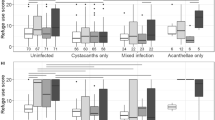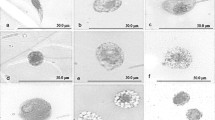Abstract
The present study is based on infection experiments of two different swim bladder parasite species, Anguillicola crassus Kuwahara et al., 1974 and Anguillicola novaezelandiae Moravec and Taraschewski, 1988, which were experimentally transferred to the two eel species Anguilla anguilla Linnaeus, 1758 and Anguilla japonica Temmink and Schlegel, 1846, respectively. The host-parasite groups were selected due to their different grades of mutual adaptation. The main aim of this study was to analyze the stress responses within the parasites, which were confronted with different hosts, i.e. with different stressors related to the respective host. For this purpose, mean intensities, recovery rates, larvae output, and levels of synthesized heat shock proteins (Hsp70) were determined in nematodes of each infection group. Increased stress responses were detected in the endemic system of A. crassus parasitizing A. japonica and A. crassus in its recently acquired host A. anguilla, which seems to be associated with the immune response of the particular host species and the expenditure of energy on producing larvae. A. novaezelandiae showed overall weak activities in its unknown host species A. japonica, with the lowest recovery rate of all examined groups neither featuring elevated Hsp responses, nor a high mean intensity, nor any reproductive output. On the contrary, in A. anguilla, the parasite reached higher recovery rates, mean intensities, and reproductive output, but no increased Hsp70 levels could be detected. The four considered factors proved partially interdependent, whereas few results did not follow a clear pattern.



Similar content being viewed by others
References
Arizono N, Yamada M, Tegoshi T, Takaoka Y, Ohta M, Sakaeda T (2011) Hsp12.6 expression is inducible by host immunity in adult worms of the parasitic nematode Nippostrongylus brasiliensis. PLoS ONE 6(3), e18141
Arts MJSJ, Schill RO, Knigge T, Eckwert H, Kammenga JE, Köhler HR (2004) Stress proteins (Hsp70, Hsp60) induced in isopods and nematodes by field exposure to metals in a gradient near Avonmouth, UK. Ecotoxicology 13:739–755
Barry J, McLeish J, Dodd JA, Turnbull JF, Boylan P, Adams CE (2014) Introduced parasite Anguillicola crassus infection significantly impedes swim bladder function in the European eel Anguilla anguilla (L.). J Fish Dis 37:921–924
Basu N, Nakano T, Grau EG, Iwama GK (2001) The effects of cortisol on heat shock protein 70 levels in two fish species. Gen Comp Endocrinol 124:97–105
Basu N, Todgham AE, Ackerman PA, Bibeau MR, Nakano K, Schulte PM, Iwama GK (2002) Heat shock protein genes and their functional significance in fish. Gene 295:173–183
Bradford MM (1976) A rapid and sensitive method for the quantitation of microgram quantities of protein utilizing the principle of protein-dye binding. Anal Biochem 72:248–254
Chen HY, Cheng YS, Grabner DS, Chang SH, Shih HH (2014) Effect of different temperatures on the expression of the newly characterized heat shock protein 90 (Hsp90) in L3 of Anisakis spp. isolated from Scomber australasicus. Vet Parasitol 205:540–550
Dangel KC, Keppel M, Sures B (2013) Can differences in life cycle explain differences in invasiveness?—a study on Anguillicola novaezelandiae in the European eel. Parasitology 140:1831–1836
Dangel KC, Keppel M, Tabujew K, Sures B (2014) Effects of Anguillicola novaezelandiae on the levels of cortisol and Hsp70 in the European eel. Parasitol Res 113:3817–3822
Fazio G, Moné H, Mouahid G, Sasal P (2008) Biased sex ratio in the European eel (Anguilla anguilla) swimbladder parasite Anguillicola crassus, experimentally induced by 11-ketotestosterone. J Parasitol 94:956–958
Fazio G, Moné H, Da Silva C, Simon-Levert G, Allienne JF, Lecomte-Finiger R, Sasal P (2009) Changes in gene expression in European eels (Anguilla anguilla) induced by infection with swim bladder nematodes (Anguillicola crassus). J Parasitol 95(4):808–816
Fazio G, Sasal P, Mouahid G, Lecomte-Finiger R, Moné H (2012) Swim bladder nematodes (Anguillicoloides crassus) disturb silvering in European eels (Anguilla anguilla). J Parasitol 98:695–705
Feder ME, Hofmann GE (1999) Heat-shock proteins, molecular chaperones, and the stress response: evolutionary and ecological physiology. Annu Rev Physiol 61:243–82
Frank SN, Godehardt S, Nachev M, Trubiroha A, Kloas W, Sures B (2013) Influence of the cestode Ligula intestinalis and the acanthocephalan Polymorphus minutus on levels of heat shock proteins (Hsp70) and metallothioneins in their fish and crustacean intermediate hosts. Environ Pollut 180:173–179
Grabner DS, Schertzinger G, Sures B (2014) Effect of multiple microsporidian infections and temperature stress on the heat shock protein 70 (Hsp70) response of the amphipod Gammarus pulex. Parasite Vector 7:170
Han YS, Chang YT, Taraschewski H, Chang SL, Chen CC, Tzeng WN (2008) The swimbladder parasite Anguillicola crassus in native Japanese eels and exotic American eels in Taiwan. Zool Stud 47:667–675
Kaufmann SHE (1990) Heat-shock proteins: a missing link in the host-parasite relationship? Med Microbiol Immunol 179:61–66
Kelly CE, Kennedy CR, Brwon JA (2000) Physiological status of wild European eels (Anguilla anguilla) infected with the parasitic nematode, Anguillicola crassus. Parasitology 120:195–202
Keppel M, Dangel KC, Sures B (2014) Comparison of infection success, development and swim bladder pathogenicity of two congeneric Anguillicola species in experimentally infected Anguilla anguilla and A. japonica. Parasitol Res 113:3727–3735
Keppel M, Dangel KC, Sures B (2015) Size does matter—a closer look on Anguillicola morphology. Parasitol Res 114:3479–3486
Knopf K (2006) The swimbladder nematode Anguillicola crassus in the European eel Anguilla anguilla and the Japanese eel Anguilla japonica: differences in susceptibility and immunity between a recently colonized host and the original host. J Helminthol 80:129–36
Knopf K, Mahnke M (2004) Differences in susceptibility of the European eel (Anguilla anguilla) and the Japanese eel (Anguilla japonica) to the swimbladder nematode Anguillicola crassus. Parasitology 129:491–496
Köhler HR (2009) Die Rolle von Stressproteinen bei der Anpassung an Umweltbedingungen: Ökophysiologische, ökotoxikologische und evolutionsbiologische Implikationen. Umweltwiss Schadst Forsch 21:150–159
Kuwahara A, Niimi A, Itagaki H (1974) Studies on a nematode parasitic in the air bladder of the eel. I. Description of Anguillicola crassa n. sp. (Philometridea, Anguillicolidae). Jpn J Parasitol 23:275–279
Laemmli UK (1970) Cleavage of structural proteins during the assembly of the head of bacteriophage T4. Nature 227:680–685
Laetsch DR, Heitlinger EG, Taraschewski H, Nadler SA, Blaxter ML (2012) The phylogenetics of Anguillicolidae (Nematoda:Anguillicolidea), swimbladder parasites of eels. BMC Evol Biol 12:60
Lefebvre F, Mounaix B, Poizat G, Crivelli AJ (2004) Impacts of the swimbladder nematode Anguillicola crassus on Anguilla anguilla: variations in liver and spleen masses. J Fish Biol 64:435–447
Maresca B, Kobayashi GS (1994) Hsp70 in parasites: as an inducible protective protein and as an antigen. Cell Mol Life Sci 50(11–12):1067–74
Mazier D, Mattei D (1991) Parasite heat-shock proteins and host responses: the balance between protection and immunopathology. Springer Semin Immunopathol 13:37–53
Moravec F (2006) Dracunculoid and anguillicoloid nematodes parasitic in vertebrates. Academia, Prague
Moravec F, Taraschewski H (1988) Revision of the genus Anguillicola Yamaguti, 1935 (Nematoda:Anguillicolidae) of the swimbladder of eels, including descriptions of two new species, A. novaezelandiae sp. n. and A. papernai sp. n. Folia Parasitol 35:125–146
Münderle M (2005) Ökologische, morphometrische und genetische Untersuchungen an Populationen des invasiven Schwimmblasen-Nematoden Anguillicola crassus aus Europa und Taiwan. Dissertation, Karlsruhe Institute of Technology
Neumann W (1985) Schwimmblasenparasit Anguillicola bei Aalen. Fischer und Teichwirt 11:322
Neumann S, Ziv E, Lantner F, Schechter I (1993) Regulation Hsp70 gene expression during the life cycle of the parasitic helminth Schistosoma mansoni. Eur J Biochem 212:589–596
Newport G, Culpepper J, Agabian N (1988) Parasite heat-shock proteins. Parasitol Today 4(11):306–12
Roberts RJ, Agius C, Saliba C, Bossier P, Sung YY (2010) Heat shock proteins (chaperones) in fish and shellfish and their potential role in relation to fish health: a review. J Fish Dis 33:789–801
Siamba DN, Gatongi PN, Mulambalah CS, Ngeiywa MM, Wamae LW (2012) Stress response in infective larvae (L3) of the parasitic nematode Haemonchus contortus is accompanied by enhanced expression of heat shock proteins (Hsp70). Curr Res J Biol Sci 4(4):345–349
Sung YY, MacRae TH (2011) Heat shock proteins and disease control in aquatic organisms. J Aquac Res Development S2:006
Sures B, Radszuweit H (2007) Pollution-induced heat shock protein expression in the amphipod Gammarus roeseli is affected by larvae of Polymorphus minutus (Acanthocephala). J Helminthol 81:191–197
Teigen LE, Orczewska JI, McLaughlin J, O’Brien KM (2015) Cold acclimation increases levels of some heat shock protein and sirtuin isoforms in threespine stickleback. Comp Biochem Physiol A Comp Physiol 188:139–147
van Leeuwen MAW (1995) Heat-shock and stress response of the parasitic nematode Haemonchus contortus. Parasitol Res 81:706–709
Weclawski U, Heitlinger EG, Baust T, Klar B, Petney T, Han YS, Taraschewski H (2014) Rapid evolution of Anguillicola crassus in Europe: species diagnostic traits are plastic and evolutionarily labile. Front Zool 11:74
Würtz J, Taraschewski H (2000) Histopathological changes in the swimbladder wall of the European eel Anguilla anguilla due to infections with Anguillicola crassus. Dis Aquat Organ 39:121–134
Würtz J, Taraschewski H, Pelster B (1995) Changes in gas composition in the swimbladder of the European eel (Anguilla anguilla) infected with Anguillicola crassus (Nematoda). Parasitology 112:233–238
Author information
Authors and Affiliations
Corresponding author
Ethics declarations
Funding
This work was supported by Deutsche Forschungsgemeinschaft (DFG; grant number SU217/12-1).
Conflict of interest
The authors declare that they have no conflict of interest.
Ethical approval
All applicable international, national, and/or institutional guidelines for the care and use of animals were followed. This article does not contain any studies with human participants performed by any of the authors.
Rights and permissions
About this article
Cite this article
Keppel, M., Dangel, K.C. & Sures, B. The Hsp70 response of Anguillicola species to host-specific stressors. Parasitol Res 115, 2149–2154 (2016). https://doi.org/10.1007/s00436-016-4956-y
Received:
Accepted:
Published:
Issue Date:
DOI: https://doi.org/10.1007/s00436-016-4956-y




